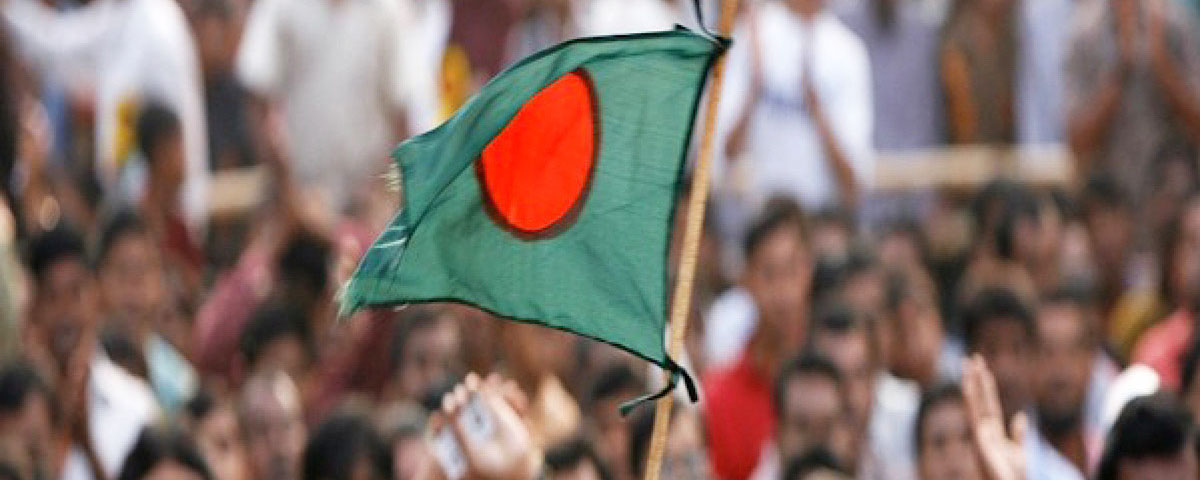Dhaka’s New Turning Point


When on August 17, 2025, Bangladesh's Army Chief, General Wakar-uz-Zaman, firmly reiterated the importance of secularism in the country and the army's role in maintaining peace, it was not merely a formal statement. It was a manifestation of deep concern, an attempt to gaze into the soul of a nation once again grappling with the ghosts of its past. Caught between deteriorating law and order, escalating attacks on minorities, and the uncertainty of elections scheduled for February 2026, Bangladesh stands at a dangerous crossroads. The army, which had been on a path to becoming a professional institution during the last 15 years of political stability, is now, albeit reluctantly, being dragged once again into the quagmire of the country's politics.
The end of Sheikh Hasina's long 15-year rule, which had forged a fragile yet effective civil-military balance, has created a vacuum that radical forces and old ideologies within the military are once again attempting to fill. This story is not merely about Bangladesh's internal crisis. It is also a grave strategic warning for India, as the future of a stable, secular, and friendly neighbor on its eastern border hangs in the balance. This analysis delves into the historical roots of Bangladesh's complex civil-military equation, the paradoxes of the Hasina era, and the dangerous vacuum that emerged after her fall, which will define not only Dhaka's future but also the stability of the entire region.
Shadows of the Past
Bangladesh's tragedy is that despite its liberation in 1971, it could not entirely eradicate the culture of Pakistani military intervention from its politics. The period from the 1970s to the 1990s is a grim chapter of bloody military coups, political assassinations, and weak democratic institutions. The assassination of Sheikh Mujibur Rahman (1975), the counter-coup and assassination of Brigadier Khaled Musharraf, General Zia-ur-Rahman's seizure of power and his subsequent assassination, and finally, General H.M. Ershad's coup—all are parts of the same story: an army deeply divided by ideologies, which politicians attempted to use for their own interests, and ultimately fell victim to the same.
This period created an enduring distrust, where civilian leadership viewed the army as a threat and the army considered civilian leaders incompetent and corrupt. The restoration of the parliamentary system in 1991 and the rivalry between Sheikh Hasina and Khaleda Zia strengthened civilian leadership but also institutionalized factionalism within the military, where both parties promoted their loyal officers.
Hasina's Paradox
When Sheikh Hasina returned to power in 2009, she was fully aware of this bloody legacy. She forged a new, unprecedented, and contradictory balance with the army, which could be likened to a 'golden cage.' This was the foundation of her 15 years in power.
To make the cage 'golden,' Hasina pursued a comprehensive policy of appeasing the military. She vastly expanded the army's budget, equipped it with state-of-the-art weaponry, provided lucrative construction contracts, and increased their participation in UN peacekeeping missions, a major source of prestige and income for officers. She also turned a blind eye to the army's illegal trafficking networks and widespread corruption. It was a clear bargain—as long as the army stayed out of politics, it would be rewarded economically.
But at the same time, she also strengthened the bars of that cage. The 2009 Bangladesh Rifles (BDR) mutiny was a pivotal moment in this strategy. In this rebellion, in which radical organizations like Jamaat-e-Islami and Hizb-ut-Tahrir were allegedly complicit, Hasina chose a political solution rather than allowing direct military intervention. She utilized forces under the Home Ministry, thereby preventing deeper divisions and bloodshed within the army. India's strong support during this crisis also strengthened her hand against the military.
Subsequently, Hasina systematically disempowered the army. In 2011, she abolished the provision of a 'caretaker government' through the 15th constitutional amendment—the very provision the army had used to seize power in 2007. In 2013, she handed down death and life imprisonment sentences to hundreds of soldiers and officers involved in the Bangladesh Rifles mutiny, sending a harsh message to the military. She promoted her loyalists to top positions through "note sheet promotions," which allegedly included the appointment of her relative, General Zaman, as Army Chief. Concurrently, she used civilian agencies like the Rapid Action Battalion (RAB) to crush opposition and dissent, effectively eliminating the army's role in domestic politics.
From India's perspective, this 'golden cage' model was a strategic boon. Hasina's rule not only brought economic stability to Bangladesh but also cracked down on anti-India militant groups and promoted a secular agenda, which was crucial for New Delhi's security interests.
The Shattering of the Cage and the Era of Uncertainty
So why did this balance break? The nationwide student protests of 2024 shattered this delicate equation. Initially, the army supported the government by cracking down on protesters. But as the movement gained popularity and became nationwide, the army made a crucial calculation. Further supporting Hasina would mean widespread bloodshed, which would not only tarnish their professional image but also directly drag them into the political quagmire they had avoided for 15 years. This could also lead to deep divisions within the army.
Therefore, the army chose the path of self-preservation. They avoided direct intervention by convincing Hasina to step down and by supporting an interim government.
However, this step has inadvertently opened a 'Pandora's Box.' The vacuum created by Hasina's departure is now filling dangerously. The interim government has altered the civil-military equation in two ways. First, divisions within the army are once again increasing. Officers with radical Islamic leanings are reportedly being promoted to higher positions. Approximately 300 convicts from the 2009 mutiny have been released. General Zaman has announced an investigation into atrocities committed under the Hasina regime, which could signal a purge of loyalists within the army. Growing security cooperation with Pakistan is likely to further embolden Islamist and anti-India elements in the military.
Second, the army is now reluctantly involved in maintaining law and order and domestic politics, creating palpable frustration. General Zaman's statement that "the army is for national defense, not policing," reflects this very frustration. Meanwhile, Islamist forces have strengthened, attacks on minorities have increased, and the crisis of civilian leadership has deepened. With Sheikh Hasina and the Awami League out of the political landscape, and BNP chairperson Khaleda Zia in poor health, the country faces a dangerous political vacuum.
Delhi's Dilemma
For India, this situation is like a strategic nightmare coming true. A period of 15 years of stability has now turned into uncertainty and instability. New Delhi faces several serious concerns:
Rise of Radicalism: A weak and unstable Bangladesh provides fertile ground for radical Islamic groups, which could directly impact India's internal security, especially in West Bengal and the northeastern states.
China and Pakistan's Influence: The political vacuum offers China and Pakistan a golden opportunity to expand their influence in Bangladesh, potentially diminishing India's strategic advantage in the region.
Economic and Connectivity Projects: India has invested heavily in connectivity and trade with Bangladesh. Political instability could jeopardize all these projects.
Security of Minorities: Any attacks on Hindus and other minorities in Bangladesh have political and social repercussions in India.
The upcoming elections may not be a solution to this crisis, but rather the beginning of its next chapter. A weak civilian government, regardless of which party is in power, will increase its dependence on the military, further enhancing the army's influence. If the elections are violent or their results disputed, the risk of direct military intervention will increase even further.
The conclusion is that the end of the Hasina era in Bangladesh is the end of an epoch. The 'golden cage' she built has shattered, and now the ghosts of 1975 are once again peeking out from the barracks. For India, this is not just a crisis in a neighboring country. It is the biggest test of its 'Neighborhood First' policy. New Delhi will have to strike a very delicate balance—supporting stability without intervention, and being prepared for a long period of uncertainty and instability to once again begin on its eastern border.